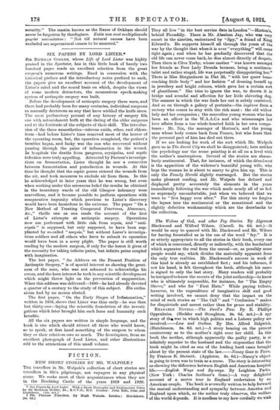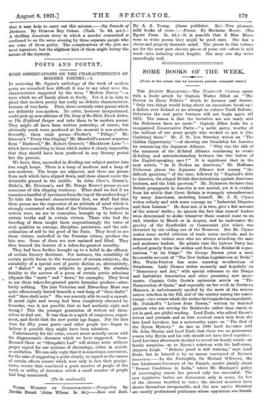The Wolves of God, and other Fey Stories. By Algernon
Blackwood and Wilfred Wilson. (Cassell. 8s. 6d. net.)—It would be easy to quarrel with Mr. Blackwood and Mr. Wilson for having forestalled us in the use of the word " fey." It is so utterly appropriate to all the stories in their book, every one of which is concerned, directly or indirectly, with the borderland which separates the real from the unreal—or, as possibly some people would say, which divides the materially apparent from the only true realities. Mr. Blackwood's success in work of this kind is already an established fact ; and his influence, if not his hand, is felt throughout the book, although his name is signed to only the last story. Many readers will probably be intrigued to know the secrets of the joint authorship—to know who is ultimately responsible, for instance, for " The Empty Sleeve," and who for " First Hate." While paying tribute, however, to the expenditure of imaginative skill and good writing involved, we cannot deny that the impact on the mind of such stories as " The Call " and " Confession " makes for disquietude and unrest rather than for peace and stability.
READABLE Novurs.—The Devil's Paw. By E. Phillips Oppenheim. (Hodder and Stoughton. 8s. 6d., not.)—A spy story of this war in which high politics and a Labour policy are involved.—Law and Outlaw. By Mrs. Alfred Sidgwick. (Hutchinson. 8s. 6d. net.)—A story bearing on the present controversy as to the mother's right over her child. In this book the mother, although apparently the guilty party, is so infinitely superior to the husband and the stepmother that the book might be cited as one of the leading hard cases brought about by the present state of the law.—Nancy Goes to Town. By Frances R. Sterrett. (Appleton. Ss. 6c1.)—Nancy's object in going to town was to train as a nurse. The story is interesting as showing the difference between English and American hospital life.—English Ways and By-ways. By Leighton Parks. (New York : Charles Scribner's Sons.)—A very delightful account of a motor tour in England undertaken by an American couple. The book is avowedly written to help forward the mutual understanding and sympathy between America and England upon. which, as the author truly observes, the welfare of the world depends. It is needless to say how cordially we wish that it may help to carry out this mission.--Six Seconds of Darkness. By Octavos Roy Cohen. (Nash. 7s. ad. net.)— A thrilling American story in which a murder committed is confessed to on the same evening by three separate people who are none of them guilty. The complications of the plot are most ingenious, but the slightest hint of them might betray the nature of the mystery.



































 Previous page
Previous page